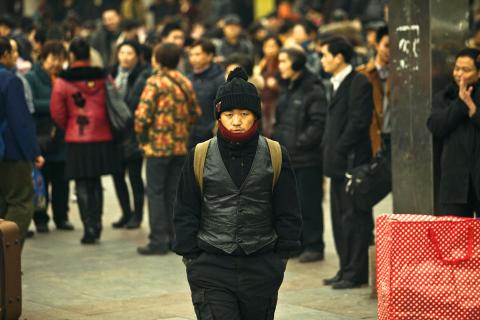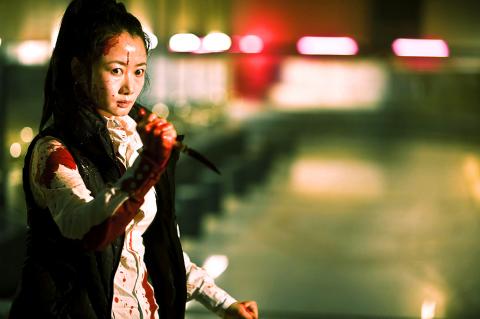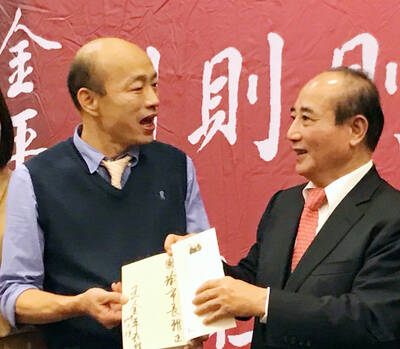Ever since his debut feature The Pickpocket (小武, 1997), Chinese director Jia Zhangke (賈樟柯) has never turned his gaze away from the tremendous political and social changes in contemporary China and their far-reaching impact on the individual, building an internationally lauded oeuvre noted for a quiet, perceptive documentary realism, with Still Life (三峽好人, 2006) a notable example.
In Jia’s latest film, A Touch of Sin (天注定), fans should expect nothing sedate and everyday. Representing a distinct change of pace and tone from his previous work, it draws its inspiration from real-life tabloid news to spin several loosely connected, uneven stories about ordinary people pushed over the edge, replete with explosive violence and searing fury. Though the martial-arts cinema of King Hu (胡金銓) is avowedly cited as a major influence, the film is much more in line with the work of Quentin Tarantino and marks the director’s most accessible, mainstream-friendly effort to date.
Composed of four chapters, each centered on a different character, the film opens in the dusty landscape of China’s northern Shanxi Province where corrupt officials and predatory businessmen get rich by selling and exploiting state assets. Determined to expose the shady dealings of local big shots, villager Dahai, played by the imposing Jiang Wu (姜武), starts a one-man campaign against the village chief and mine owner, whose Maserati and private jet stand in stark contrast to the poverty-stricken village. Yet, Dahai’s crusade against injustice is met with mockery from his fellow villagers who see him as an old fossil clad in a worn-out army coat. After a vicious assault by the minions of a local boss, however, he digs up an old rifle and exacts a deadly revenge.

Photo courtesy of Joint Entertainment International Inc.
Dahai’s killing spree is followed by the homecoming of Zhou San (Wang Baoqiang, 王寶強), a migrant worker who drifts in search of a means to support his family. He returns home for his mother’s 70th birthday celebration in the southwestern city of Chongqing, but no one seems happy to see him, not even his wife and young son. Suspecting her husband of misdeeds, the wife demands that he should stop sending money back home. What she doesn’t know, however, is that Zhou San makes a living by robbing and killing members of China’s new wealthy class in the country’s fast growing cities.
Elsewhere in central China, Xiao Yu, played by Jia’s regular and wife Zhao Tao (趙濤), gives her married lover an ultimatum. But instead of finding love, the massage parlor receptionist is forced to brandish a knife at a customer who tries to press her into prostitution in a way that brings to mind the heroine in Hu’s martial-arts classic A Touch of Zen (俠女), which the film pays titular homage to.
In the end, life remains bleak in the industrial city of Dongguan. Like countless young men and women from the provinces, 19-year-old Xiao Hui (Luo Lanshan, 羅藍山) finds no hope of escaping from soul-crushing jobs either at sweatshops or brothel-hostess bars peddling girls in skimpy military costumes.

Photo courtesy of Joint Entertainment International Inc.
Throughout the film, violence envelops cities and towns like a thick layer of smog as itinerant characters, hopelessly displaced by sweeping social changes, fall victim to the widening gap between the rich and the struggling poor.
China’s systemic corruption, exploitative labor conditions and other social ills, fueled by the country’s rapid economic expansion, is manifested in senseless killings, gunplay and soulless cities inhabited by ruffians and whores — occasionally played to a comic effect as in the fleeting cameo by the director himself as a gold chain-wearing pimp.
Even though the bloody genre elements seem at odds with the more documentary-like camera work, Jia excels in seeking poignancy and poetry in the injured and the insulted, whether it is the faces of the villagers who are sent to welcome a corrupt bigwig or the farmers growing vegetables on the river bank in Chongqing, where high rises loom in hazy sky.

Photo courtesy of Joint Entertainment International Inc.
Through Jia’s cinematic eye, violence is never rendered celebratory or thrilling. During one sequence, an abusive customer repeatedly whips Zhao’s character with a stack of money, while a Louis Vuitton handbag-toting woman is gunned down in broad daylight. As we watch a workhorse savagely whipped by its master in another sequence, we are reminded of the brutality and existential despair that are hallmarks of being alive in today’s China.
A Touch of Sin is currently showing as part of a mini retrospective of Jia Zhangke’s work, which includes The Pickpocket, Platform (站台, 2000), Unknown Pleasures (任逍遙, 2002) and Still Life. The festival starts today and runs through March 20 at Eslite Art House (誠品電影院) and Spot Huashan Cinema (光點華山電影館). The director will attend question-and-answer sessions and hold panel discussions during the festival period. More information can be obtained at the event’s Facebook page at facebook.com/a.touch.of.sin.taiwan.

The depressing numbers continue to pile up, like casualty lists after a lost battle. This week, after the government announced the 19th straight month of population decline, the Ministry of the Interior said that Taiwan is expected to lose 6.67 million workers in two waves of retirement over the next 15 years. According to the Ministry of Labor (MOL), Taiwan has a workforce of 11.6 million (as of July). The over-15 population was 20.244 million last year. EARLY RETIREMENT Early retirement is going to make these waves a tsunami. According to the Directorate General of Budget Accounting and Statistics (DGBAS), the

Many will be surprised to discover that the electoral voting numbers in recent elections do not entirely line up with what the actual voting results show. Swing voters decide elections, but in recent elections, the results offer a different and surprisingly consistent message. And there is one overarching theme: a very democratic preference for balance. SOME CAVEATS Putting a number on the number of swing voters is surprisingly slippery. Because swing voters favor different parties depending on the type of election, it is hard to separate die-hard voters leaning towards one party or the other. Complicating matters is that some voters are

Five years ago, on the verge of the first COVID lockdown, I wrote an article asking what seemed to be an extremely niche question: why do some people invert their controls when playing 3D games? A majority of players push down on the controller to make their onscreen character look down, and up to make them look up. But there is a sizable minority who do the opposite, controlling their avatars like a pilot controls a plane, pulling back to go up. For most modern games, this requires going into the settings and reconfiguring the default controls. Why do they

Take one very large shark, a boat (we’re gonna need a bigger one of those) and a movie that ran way over budget and you’ve got all the ingredients of a career-making film for one of Hollywood’s most successful directors. Now fans of Jaws — Steven Spielberg’s terrifying thriller about a man-eating shark — can re-live the movie as it celebrates its 50th anniversary in an exhibition at the Academy Museum in Los Angeles. “The film certainly cost me a pound of flesh, but gave me a ton of career,” Spielberg told reporters as he toured exhibits of props and memorabilia